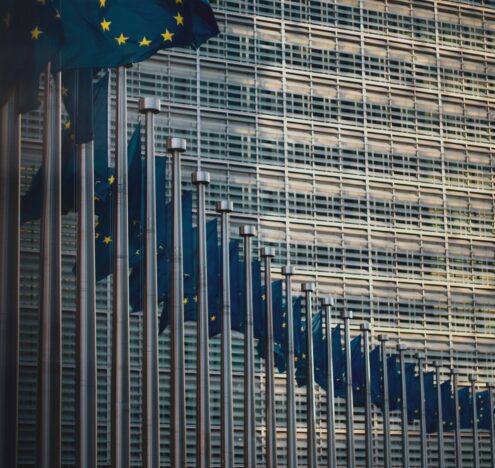As turmoil continues to engulf the streets of Khartoum and the UN estimates that more than 800,000 Sudanese people may flee their homes and livelihoods in the coming weeks, the implications of this conflict reach far beyond Sudan’s borders. When deadly fighting is brought to the doorsteps of those in Khartoum it inevitably goes beyond the confines of the city. Surrounding cities and countries will feel the shockwaves of this war for years to come. Neighboring a region deeply troubled by drought, violent extremism, food security, and ongoing conflicts, what happens to Sudan also happens to the Horn of Africa region. The spillover effects are high, and the consequences are unsettling.
Despite numerous calls for a ceasefire, the ongoing struggle for power between Sudan’s armed forces (SAF) and the Rapid Support Forces (RSF), a paramilitary group primarily controlling Western Sudan, remains uncontained and increasingly violent. Both SAF and RSF face numerous accusations of human rights abuses against Sudanese citizens, and this round of fighting is just the latest and deadliest reiteration of rising tensions over the deeply rooted militant quest for control that Omar al-Bashir planted during his regime.
For decades, the Sudanese people have yearned for a government that embodies and upholds the values of democracy. Despite the escalating violence, the people of Sudan remain hopeful but weary of the impending tribulations they face. But how much longer must the Sudanese people only have hope to hold on to?
SUDAN’S BATTLING GENERALS
Four years have passed since the Sudanese people celebrated the ousting of their long-time autocratic President Omar al-Bashir, but their celebrations were cut short as their fight for a democratic and civilian government waged on in an unprecedented manner.
Only two years after the establishment of Sudan’s civilian-military transitional government and the development of a new framework for democratic transition, the military component of the coalition co-opted and dissolved the hard work of the Sudanese people and plunged the nation back into uncertainty. General Abdel-Fattah al-Burhan, commander of the SAF, and General Mohamed Hamdan Dagalo, commander of the RSF, both leaders of the 2021 military coup, remain intrinsically opposed to each other. As each side vies for power in Sudan, the military commanders who once shared space under the al-Bashir regime now cannot coexist in the current context.
For weeks, Khartoum has become an indiscriminate war zone void of concern for civilians. There is consensus from the international community that “the conflict in Sudan will not, and must not, be resolved on the battlefield.” However, as international institutions and governments formulate their recommendations on how to end hostilities, it’s crucial to understand that the warring parties and Sudanese leaders do not carry the sole burden of this responsibility.
THE NEED FOR CREATIVITY
During the Summit for Democracy in March 2023, the Biden administration boasted that it’s up for the challenge to defend democracy but has yet to make major inroads in the Horn of Africa dynamics. After losing two special envoys for the Horn of Africa in a 12-month span, the spillover effects of the conflict in Sudan have added pressure on the administration in an already volatile area.
The fundamental values of democracy are under fire in Sudan, and this is the Biden administration’s opportunity to rise from its lackluster support for conflicts across eastern Africa over the past couple of years.
In the past two years alone, the Horn of Africa has experienced two intrastate wars, an increase in violent extremism, and widespread humanitarian need. As the situations in Sudan and the Horn of Africa continue to make headlines, media and US policymakers’ attention should not cease once the fighting does. It is important to recognize the regional instability triggers, particularly post-conflict Ethiopia, South Sudanese elections, and the under-reported conflict in Somaliland’s Las Anod region.
As the White House and Congress look to respond to what is taking place in Sudan, there is a need for innovative diplomatic tools outside of the usual sanction regimes. From what we have seen in Mali and Burkina Faso, sanctions and isolation policies have adverse effects on local communities rather than changing the actions of governmental or military leaders. Recently and quite notably, US Treasury Secretary Janet Yellen acknowledged that some of the United States harshest sanctions, like those on Iran, haven’t worked favorably toward their desired behavioral or policy changes, which has left many wondering, why sanctions? As Sudanese people look to sustain themselves during this very tough time, the added burden sanctions will have on an already grim economic situation will make access to cash and other essential commodities even harder. If the Biden administration is to truly make the case for democracy and its ability to deliver tangible benefits, the administration must acknowledge that sanctions are not a solution.
To produce lasting and promising peace, finding a solution for Sudan must look different than it has in places like Iran, Mali, and Burkina Faso. Any lasting resolution to this conflict requires a reinforced effort by supporting Sudan’s internal and institutional development that must be informed and led by the Sudanese people. Attempting to broker peace solely between warring parties only undermines the hard work and perseverance the Sudanese people have embodied in their struggle for democratic transition.
The fundamental values of democracy are under fire in Sudan, and this is the Biden administration’s opportunity to rise from its lackluster support for conflicts across eastern Africa over the past couple of years. Without the international community’s unwavering and tangible diplomatic backing to bring the warring forces together in the interest of the citizens and stability of Sudan, the nation’s fight for democracy may be on its last leg.
So, what are the current needs and concerns in Sudan? As the Senate Foreign Relations Committee meets this Wednesday, May 10, 2023, to discuss options for an effective policy response to the conflict in Sudan, we urge US policymakers to consider these recommendations. First, there needs to be a sustained ceasefire that applies to the SAF and RSF and the breakaway fighting occurring in Western Darfur. Second, there is a crucial need for an open and expansive humanitarian corridor in Khartoum and throughout Sudan. As this conflict continues to take a toll on people’s livelihoods and deprive them of essential commodities and services, the humanitarian response must ensure safe conditions for administering aid. Direct support to the various hospitals in and around Khartoum is critical for effective relief efforts. To this end, prominent organizations such as the World Health Organization and Amnesty International have been advocating for the establishment of a sustainable humanitarian corridor in Sudan.
Finally, recommendations for ending the conflict between SAF and RSF should center the Sudanese people and diaspora in its development and implementation. Aligned with the US government’s vision to ensure local actors are at the forefront of cultivating solutions to their most pressing issues, it’s imperative to amplify and prioritize the voices of the citizens of Sudan for better-informed and lasting conflict resolution. Moreover, the Sudanese diaspora population has shown in the past that they serve a key role in stabilizing the nation and continuously work to provide resources, advocate for transparency, and ensure that global leaders keep their eyes on Sudan.
As the Biden administration and the international community look for ways to resolve the crisis in Sudan, it’s important to center policy decisions around “rejecting a return to normalcy.” Before the April 15, 2023 fighting, Sudan was by no means in a normal state. The transition was still in a highly tense position, prospects of famine were increasing, and a severe lack of access to justice impedes citizen’s ability to voice their grievances. The overall goal in Sudan for the Biden administration should not be to return Sudan to what it was but to help forge a new Sudan under democratic and institutionally credible principles of inclusive governance.





















